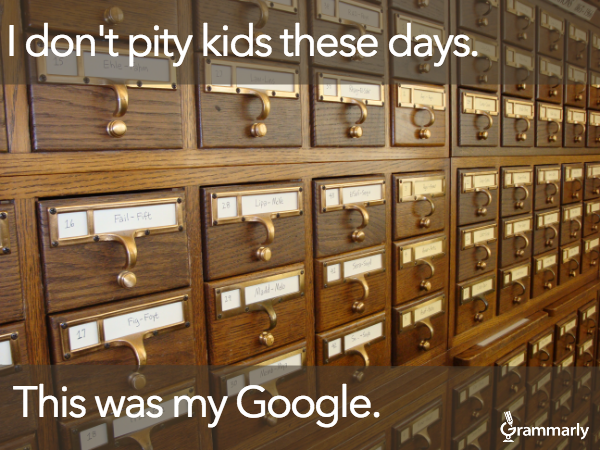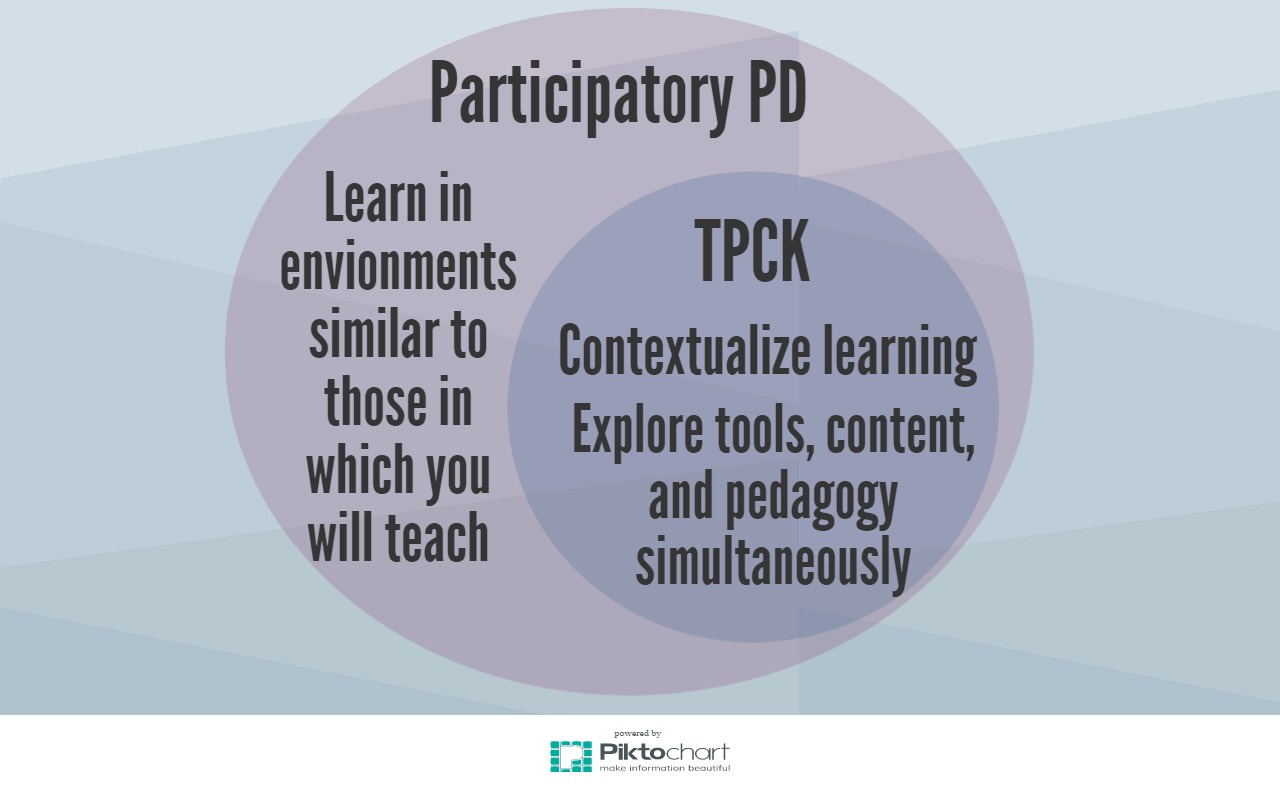On Friday, I gave a talk on this paper at the SITE conference in Las Vegas on the relationship between Participatory Professional Development and Technological Pedagogical Content Knowledge (TPCK). Generally, I asserted that all of these innovations in technology are changing the ways learners interact with information, learning environments, their teachers, and each other. They are more connected – to everything – which means that we need to reenvision our understandings of what learning environments look like, how to design for them, and what counts as “engagement” and “learning” within them. However, this also means that we need to reenvision what professional development looks like and the ways in which it presents new information to teachers so that they can learn how to design for and teach in these new environments.
Especially as more and more education moves to hybrid or online spaces, we need to consider what new tools and networked spaces afford (how do they extend, expand, and enhance capabilities for learning), and how do they constrain (in what ways do these tools drive, focus, or constrict learners’ understandings and opportunities to explore and inquire). A salient example of these affordances and constraints can be seen in a conversation I have often with English teachers. Especially in teaching research, many of my colleagues say that their students are “so much better at technology” than they are, and that the students don’t need them anymore because they have Google. Even this picture came across my feed recently:
Let’s just think about this image for a  second. Yes, we did use card catalogues, but it wasn’t our Google. Before Google search, there was nothing like Google. We conduct research in a completely new way, and it requires new skills. Just because my students have access to Google doesn’t mean they necessarily know how to conduct a productive search. And when they do search, they do not necessarily know what to do with all of that information or how to sift through it to make an argument. So many of my students would come up to me after being given a research assignment and say “Ms. Itow, I didn’t find anything on this topic.” Really? Nothing came back when you searched Google? Of course not, but they were telling me that they didn’t know what to do with the information and articles that did come back.
second. Yes, we did use card catalogues, but it wasn’t our Google. Before Google search, there was nothing like Google. We conduct research in a completely new way, and it requires new skills. Just because my students have access to Google doesn’t mean they necessarily know how to conduct a productive search. And when they do search, they do not necessarily know what to do with all of that information or how to sift through it to make an argument. So many of my students would come up to me after being given a research assignment and say “Ms. Itow, I didn’t find anything on this topic.” Really? Nothing came back when you searched Google? Of course not, but they were telling me that they didn’t know what to do with the information and articles that did come back.
So this is where a teacher’s technological content knowledge becomes extremely important. It isn’t enough to know the content, and it isn’t enough to know that tool to use. Teachers must have intimate knowledge of how to access and process the content using the tool, while understanding how to help their students engage with and learn to use the tool productively.
So then, what do we mean by engagement? Is it seat time? Is it sitting up straight with eyes on the teacher? Is it opening an email with relevant text in it? I’d argue that these new environments require us to reevaluate what we mean by engagement – to define it as Randi Engle did as Productive Disciplinary Engagement that encourages learners to contextualize content, ask probing questions, and discuss what, how, and why they are learning.
But teachers need to be trained to foster this kind of engagement. At SITE, I heard a lot of talks about fostering TPCK, and I think they are right on a lot of levels. A lot of PD I have sat through and read about tends to focus on learning about this tool, this practice, or this content. And while that can be interesting, looking at technological, pedagogical, or content knowledge individually removes the context of the classroom from the learning experience, making PD seem stilted and removed from the classroom. Participatory Professional Development and TPCK came out of theoretically different traditions, but that doesn’t mean they are at odds with one another.
 By giving teachers an opportunity to work and learn in the kinds of spaces we want them to foster for their students (e.g., participatory spaces that foster connected learning and PDE), they are given the opportunity to contextualize their learning as it relates to their own classroom practice. They can explore new tools, content, and pedagogical practices simultaneously, but instead of doing this individually, they have a community on which they can lean. They can ask each other questions, mentor one another, garner support, and push back in productive ways. They can leverage the wealth of information and expertise that lies within the community to gain deeper understanding of new content and decide if and how they might adapt new tools or practices to fit their needs.
By giving teachers an opportunity to work and learn in the kinds of spaces we want them to foster for their students (e.g., participatory spaces that foster connected learning and PDE), they are given the opportunity to contextualize their learning as it relates to their own classroom practice. They can explore new tools, content, and pedagogical practices simultaneously, but instead of doing this individually, they have a community on which they can lean. They can ask each other questions, mentor one another, garner support, and push back in productive ways. They can leverage the wealth of information and expertise that lies within the community to gain deeper understanding of new content and decide if and how they might adapt new tools or practices to fit their needs.
In this way, we can use Participatory Professional Development to impact teachers’ TPCK, and ultimately shift their teaching practices. By engaging as their students might in productive discourse and reflective thinking, they can experience the benefits of learning in these environments, which may help them design such environments for their students.

Emily
June 11, 2015 at 7:55 amRebecca,
This is such a nice summary of the direction that we need to go in regards to teacher learning. Thank you for this piece!